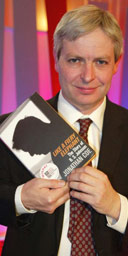
By the most pungent of ironies, a book about a writer who had little money and no glory in his lifetime last night reaped £30,000 plus the glory of the leading British book prize in its field, for another author.
A biography of BS Johnson, the avant-garde novelist who killed himself at the age of 40 in 1973 partly out of despair at his lack of recognition, won this year's Samuel Johnson award for non-fiction, sponsored by BBC 4.
In contrast to the lukewarm or baffled reception given to Johnson's seven novels, Jonathan Coe's biography of him, Like A Fiery Elephant, left one reviewer "so paralysed with admiration I wondered whether I would actually be able to write a review.
"[The book is] so wonderful, so compelling, so finger-tinglingly exciting. There is almost too much to say".
Even Coe - a lover of Johnson's work from youth and himself a novelist - was forced to admit in the biography that hardly anyone under 40 would have heard of his subject.
But last night's award ceremony at the Savoy hotel, London, left his memory with one posthumous consolation.
He revered, and would have felt honoured by, any association with his namesake Dr Samuel Johnson. Like him, the 18th century sage "did not suffer fools gladly and had to do a lot of boring jobs to make ends meet", the chair of judges and broadcaster Sue MacGregor, said.
"The result would be more strongly ironical if Coe's was not such a very good biography. The subject is at first someone perhaps quite difficult to like, and the way the author goes about collating the material is not conventional. But we loved the freshness of it, and admired the skill with which the story is gradually revealed to us," she said.
"[Coe] has brought marvellously to life not only BS Johnson - a brilliant and difficult man who wrote only seven novels - but the grim side of struggling to succeed in literary London in the 60s."
Johnson, a devotee of William Burroughs and the early novels of Samuel Beckett, published one book with holes cut in the pages and another with unbound chapters in a box so that chapters could be read in any order. Coe tries to emulate this by telling his story through accounts of his novels, and his fragments, and through voices talking about him, including a disordered verbatim tape recording.
The judges' collective verdict praised this as "a remarkable picture - vivid, sometimes funny, often overwhelmingly sad - of a tortured personality: a man whose writing, in spite of its fierce commitment to truth and honesty, tragically failed to keep at bay the demons that pursued him".
Last night David Hayden, product manager of Foyles' bookshop, London, called it "a masterpiece of modern biography", while Scott Packer, Waterstone's head of buying, who tipped the book to win last month, said: "The way things are going, more people will read this book about BS Johnson than have ever read his novels."
By another irony, the book narrowly beat another study of a self-perceived loser who committed suicide, Alexander Master's vivid Stuart: a Life Lived Backwards. This is the story of Stuart Shorter, whose phrase ("I'm one of the chaotics") is part of the language of care workers. Shorter was an articulate but sometimes violent vagrant whom Masters met while working in a day centre.
He threw himself under a train in his early 30s. The judges did not feel that his verdict on Masters' first draft of his biography - "bollocks boring" - was true of the finished book.
The other shortlisted books were: Maximum City by Suketu Mehta; Istanbul, by Orhan Pamuk; Matisse the Master, by Hilary Spurling; and The Italian Boy by Sarah Wise. The other judges were mathematician and broadcaster Marcus du Sautoy; Sunday Times deputy literary editor Andrew Holgate; historian and broadcaster Maria Misra and journalist and broadcaster John Simpson.
Heresy and heroism
From Like a Fiery Elephant by Jonathan Coe (Picador £20)
And faith in the novel has this, at least, in common with faith in God: in both cases, you can always tell the genuine article because it will always be riddled with doubt. Which means that it's often the heretic who is closer to God than the regular, unquestioning churchgoer; and as I said before, probably the best way to think about BS Johnson's novels is to conceive of them not as experiments, but as literary heresies.
Like all heresies, his novels challenge our most fundamental beliefs: our belief in the moral integrity of 'fiction', our belief in the usefulness of storytelling when the daily truths thrown up by our misbegotten world cry out for immediate, practical attention. The challenge is posed not just by his work as a whole, but by each novel individually. We could ask ourselves whether we are 'writing as though it mattered', or we could be more specific than that, and ask ourselves: Is my first novel as adventurous, as risk-taking, as Travelling People? Have I ever written, or will I ever write, anything as ruthlessly self-interrogating as Albert Angelo? Could I ever match Trawl for a sustained feat of muscular lyricism and unsparing scrutiny of the past? ... Could I walk right to the very edge of the novel's possibilities, and even put one foot suicidally over the precipice, as Johnson dared to do in See the Old Lady Decently? These are the questions that BS Johnson's novels should be forcing subsequent generations of writers to ask themselves. Amongst Those Left Are We (sic). Here is the baton: do we have the courage to run with it?

